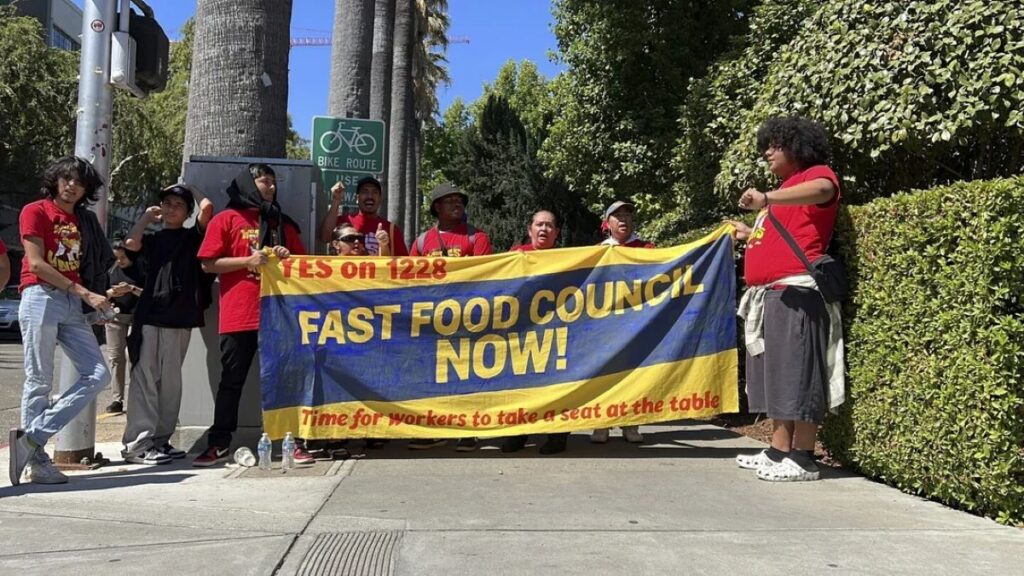
California is witnessing a wave of job losses in the fast food industry as the state prepares to implement a new minimum wage of $20 per hour next week. According to a report from The Wall Street Journal, many restaurants, particularly pizzerias, are making significant cuts in response to the impending wage hike.
This move is anticipated to result in the elimination of hundreds of jobs, reduced working hours, and a freeze on hiring across multiple establishments. The Fast Act, signed into law by Democratic Governor Gavin Newsom in September, mandates fast food chains with 60 or more locations nationwide to comply with the wage increase.
The legislation, championed by labor unions and the healthcare industry, aims to uplift workers’ earnings. Governor Newsom emphasized the significance of the new law, noting that it would impact 80% of the workforce.
Layoffs in the fast food sector began as early as last year, with Pizza Hut being one of the prominent chains announcing significant cuts. More than 1,000 delivery drivers are slated to lose their jobs in California, while some franchises have opted to discontinue delivery services entirely.
ALSO READ: “Taxpayers Deserve Answers!” NYC Democrat Fumes As Migrants Claim Towed Cars Outside Shelter
“Where select California franchisees have elected to make changes to their staffing approach, access to delivery service will continue to be available via Pizza Hut’s mobile app, website, and phone ordering, and the customer ordering experience will remain consistent,” a Pizza Hut spokesperson told USA TODAY Wednesday.
Excalibur Pizza, a Round Table Pizza franchisee, plans to eliminate 73 driver positions, constituting 21% of its workforce, in April. “The franchisee is transferring their delivery services to third-party. While it is unfortunate, we look at this as a transfer of jobs,” a company rep told USA TODAY.
“As you know, many California restaurant operators are following the same approach due to rising operating costs.” Despite efforts by some businesses to circumvent the wage increase, Newsom’s administration has emphasized that there will be no exemptions.
Greg Flynn, who holds a monopoly over Panera franchises in California, attempted to exploit a loophole by claiming that restaurants producing in-house bread would be exempt from the mandate. However, Newsom’s office refuted this assertion, affirming that no exemptions would be granted.
POLL—Should the Government Increase Taxes on the Wealthy To Reduce Economic Inequality?
Chipotle and Starbucks, two major players in the fast food industry, have acknowledged the need to adjust their operations to comply with the new minimum wage.
Chipotle’s CFO indicated that the company would likely raise prices to offset the increased labor costs. Meanwhile, Starbucks, which recently closed several stores in California, has committed to a minimum 3% wage increase, effective January 1st.
The impact of California’s $20 minimum wage extends beyond fast food chains, affecting various businesses categorized as “fast food restaurants” under the law. As the state moves towards implementing the wage hike, stakeholders are grappling with the economic ramifications and seeking ways to adapt to the new regulatory landscape.
ALSO READ: Gavin Newsom Exempts Panera Bread From New $20 Hourly Minimum Wage, Sparking Controversy
In conclusion, the impending $20 minimum wage in California is prompting significant changes in the fast food industry, including job losses and operational adjustments. While the wage increase aims to improve workers’ livelihoods, its implementation poses challenges for businesses and raises questions about its long-term implications.
You Might Also Like:
NYC “Worst Landlord” Bags Jail Time for Ignoring Repairs
Boeing Announces CEO Dave Calhoun Will Step Down
Abortion Opponents Back Up Arguments Against Abortion Pills With Scientific Study
Pharmacy Unionizing Efforts Gain Momentum As CVS Omnicare in Las Vegas Seeks To Join
President Joe Biden Pokes Fun at Trump’s Alleged Golf Win
